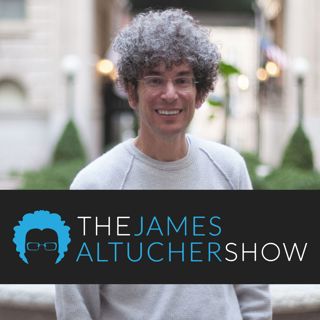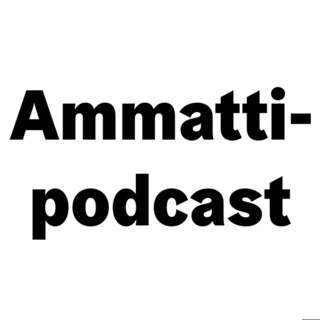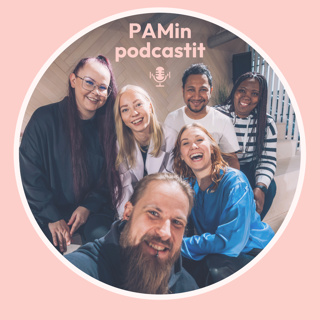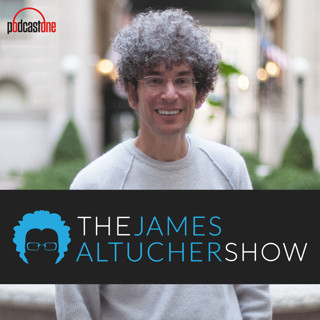
How Anyone Can Make Their First Million, James Altucher on My First Exit
A Note from James: You know what drives me crazy? When people say, "I have to build a personal brand." Usually, when something has a brand, like Coca-Cola, you think of a tasty, satisfying drink on a hot day. But really, a brand is a lie—it's the difference between perception and reality. Coca-Cola is just a sugary brown drink that's unhealthy for you. So what does it mean to have a personal brand? I discussed this with Nick Singh, and we also talked about retirement—what’s your number? How much do you need to retire? And how do you build to that number? Plus, we covered how to achieve success in today's world and so much more. This is one of the best interviews I've ever done. Nick’s podcast is My First Exit, and I wanted to share this conversation with you. Episode Description: In this episode, James shares a special feed drop from My First Exit with Nick Singh and Omid Kazravan. Together, they explore the myths of personal branding, the real meaning of success, and the crucial question: “What's your number?” for retirement. Nick, Omid, and James unpack what it takes to thrive creatively and financially in today's landscape. They discuss the value of following curiosity, how to niche effectively without losing authenticity, and why intersecting skills might be more powerful than single mastery. What You’ll Learn: Why the idea of a "personal brand" can be misleading—and what truly matters instead. How to define your "number" for retirement and why it changes over time. The difference between making money, keeping money, and growing money. Why intersecting skills can create unique value and career opportunities. The role of curiosity and experimentation in building a fulfilling career. Timestamped Chapters: 01:30 Dating Advice Revisited 02:01 Introducing the Co-Host 02:39 Tony Robbins and Interviewing Techniques 03:42 Event Attendance and Personal Preferences 04:14 Music Festivals and Personal Reflections 06:39 The Concept of Personal Brand 11:46 The Journey of Writing and Content Creation 15:19 The Importance of Real Writing 17:57 Challenges and Persistence in Writing 18:51 The Role of Personal Experience in Content 27:42 The Muse and Mastery 36:47 Finding Your Unique Intersection 37:51 The Myth of Choosing One Thing 42:07 The Three Skills to Money 44:26 Investing Wisely and Diversifying 51:28 Acquiring and Growing Businesses 56:05 Testing Demand and Starting Businesses 01:11:32 Final Thoughts and Farewell Additional Resources: Nick Singh and Omid Kazravan's Podcast: My First Exit James Altucher's Book: Choose Yourself Range: Why Generalists Triumph in a Specialized World by David Epstein: Read Here Tony Robbins’ Events: Official Site See Privacy Policy at https://art19.com/privacy and California Privacy Notice at https://art19.com/privacy#do-not-sell-my-info.
14 Helmi 1h 13min

Peter Diamandis: How to Harness the Power of Mindset in The Longevity Guidebook
A Note from James: I've done about a dozen podcasts in the past few years about anti-aging and longevity—how to live to be 10,000 years old or whatever. Some great episodes with Brian Johnson (who spends $2 million a year trying to reverse his aging), David Sinclair (author of Lifespan and one of the top scientists researching aging), and even Tony Robbins and Peter Diamandis, who co-wrote Life Force. But Peter just did something incredible. He wrote The Longevity Guidebook, which is basically the ultimate summary of everything we know about anti-aging. If he hadn’t done it, I was tempted to, but he knows everything there is to know on the subject. He’s even sponsoring a $101 million XPRIZE for reversing aging, with 600 teams competing, so he has direct insight into the best, cutting-edge research. In this episode, we break down longevity strategies into three categories: common sense (stuff you already know), unconventional methods (less obvious but promising), and the future (what’s coming next). And honestly, some of it is wild—like whether we can reach "escape velocity," where science extends life faster than we age. Peter’s book lays out exactly what’s possible, what we can do today, and what’s coming. So let’s get into it. Episode Description: Peter Diamandis joins James to talk about the future of human longevity. With advancements in AI, biotech, and medicine, Peter believes we're on the verge of a health revolution that could drastically extend our lifespans. He shares insights from his latest book, The Longevity Guidebook, and discusses why mindset plays a critical role in aging well. They also discuss cutting-edge developments like whole-body scans for early disease detection, upcoming longevity treatments, and how AI is accelerating medical breakthroughs. Peter even talks about his $101 million XPRIZE for reversing aging, with over 600 teams competing. If you want to live longer and healthier, this is an episode you can't afford to miss. What You’ll Learn: Why mindset is a crucial factor in longevity and health The latest advancements in early disease detection and preventative medicine How AI and biotech are accelerating anti-aging breakthroughs What the $101 million XPRIZE is doing to push longevity science forward The importance of continuous health monitoring and personalized medicine Timestamped Chapters: [00:01:30] Introduction to Anti-Aging and Longevity [00:03:18] Interview Start – James and Peter talk about skiing and mindset [00:06:32] How mindset influences longevity and health [00:09:37] The future of health and the concept of longevity escape velocity [00:14:08] Breaking down common sense vs. non-common sense longevity strategies [00:19:00] The importance of early disease detection and whole-body scans [00:25:35] Why insurance companies don’t cover preventative health measures [00:31:00] The role of AI in diagnosing and preventing diseases [00:36:27] How Fountain Life is changing personalized healthcare [00:41:00] Supplements, treatments, and the future of longevity drugs [00:50:12] Peter’s $101 million XPRIZE and its impact on longevity research [00:56:26] The future of healthspan and whether we can stop aging [01:03:07] Peter’s personal longevity routine and final thoughts Additional Resources: See Privacy Policy at https://art19.com/privacy and California Privacy Notice at https://art19.com/privacy#do-not-sell-my-info.
4 Helmi 1h 3min

Quantum Computing 101 with Nicolas Alexandre Roussy Newton & Gavin Brennen
A Note from James: "I have been dying to understand quantum computing. And listen, I majored in computer science. I went to graduate school for computer science. I was a computer scientist for many years. I’ve taken apart and put together conventional computers. But for a long time, I kept reading articles about quantum computing, and it’s like magic—it can do anything. Or so they say. Quantum computing doesn’t follow the conventional ways of understanding computers. It’s a completely different paradigm. So, I invited two friends of mine, Nick Newton and Gavin Brennan, to help me get it. Nick is the COO and co-founder of BTQ Technologies, a company addressing quantum security issues. Gavin is a top quantum physicist working with BTQ. They walked me through the basics: what quantum computing is, when it’ll be useful, and why it’s already a security issue. You’ll hear me asking dumb questions—and they were incredibly patient. Pay attention! Quantum computing will change everything, and it’s important to understand the challenges and opportunities ahead. Here’s Nick and Gavin to explain it all." Episode Description: Quantum computing is a game-changer in technology—but how does it work, and why should we care? In this episode, James is joined by Nick Newton, COO of BTQ Technologies, and quantum physicist Gavin Brennan to break down the fundamentals of quantum computing. They discuss its practical applications, its limitations, and the looming security risks that come with it. From the basics of qubits and superposition to the urgent need for post-quantum cryptography, this conversation simplifies one of the most complex topics of our time. What You’ll Learn: The basics of quantum computing: what qubits are and how superposition works. Why quantum computers are different from classical computers—and why scaling them is so challenging. How quantum computing could potentially break current encryption methods. The importance of post-quantum cryptography and how companies like BTQ are preparing for a quantum future. Real-world timelines for quantum computing advancements and their implications for industries like finance and cybersecurity. Timestamped Chapters: [01:30] Introduction to Quantum Computing Curiosity [04:01] Understanding Quantum Computing Basics [10:40] Diving Deeper: Superposition and Qubits [22:46] Challenges and Future of Quantum Computing [30:51] Quantum Security and Real-World Implications [49:23] Quantum Computing’s Impact on Financial Institutions [59:59] Quantum Computing Growth and Future Predictions [01:06:07] Closing Thoughts and Future Outlook Additional Resources: BTQ Technologies Website See Privacy Policy at https://art19.com/privacy and California Privacy Notice at https://art19.com/privacy#do-not-sell-my-info.
28 Tammi 1h 6min
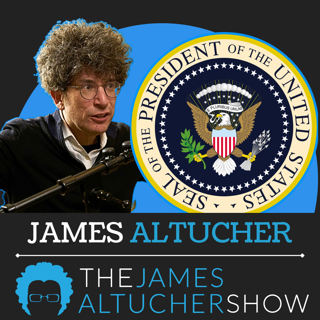
Ranking U.S. Presidents: Who Truly Deserves the Top Spot?
A Note from James: So we have a brand new president of the United States, and of course, everyone has their opinion about whether President Trump has been good or bad, will be good and bad. Everyone has their opinion about Biden, Obama, and so on. But what makes someone a good president? What makes someone a bad president? Obviously, we want our presidents to be moral and ethical, and we want them to be as transparent as possible with the citizens. Sometimes they can't be totally transparent—negotiations, economic policies, and so on. But we want our presidents to have courage without taking too many risks. And, of course, we want the country to grow economically, though that doesn't always happen because of one person. I saw this list where historians ranked all the presidents from 1 to 47. I want to comment on it and share my take on who I think are the best and worst presidents. Some of my picks might surprise you. Episode Description: In this episode, James breaks down the rankings of U.S. presidents and offers his unique perspective on who truly deserves a spot in the top 10—and who doesn’t. Looking beyond the conventional wisdom of historians, he examines the impact of leadership styles, key decisions, and constitutional powers to determine which presidents left a lasting, positive impact. From Abraham Lincoln's crisis leadership to the underappreciated successes of James K. Polk and Calvin Coolidge, James challenges popular rankings and provides insights you won't hear elsewhere. What You’ll Learn: The key qualities that define a great president beyond just popularity. Why Abraham Lincoln is widely regarded as the best president—and whether James agrees. How Franklin D. Roosevelt’s policies might have extended the Great Depression. The surprising president who expanded the U.S. more than anyone else. Why Woodrow Wilson might actually be one of the worst presidents in history. Timestamped Chapters: [01:30] What makes a great president? [02:29] The official duties of the presidency. [06:54] Historians’ rankings of presidents. [07:50] Why James doesn't discuss recent presidents. [08:13] Abraham Lincoln’s leadership during crisis. [14:16] George Washington: the good, the bad, and the ugly. [22:16] Franklin D. Roosevelt—was he overrated? [29:23] Harry Truman and the atomic bomb decision. [35:29] The controversial legacy of Woodrow Wilson. [42:24] The case for Calvin Coolidge. [50:22] James K. Polk and America's expansion. See Privacy Policy at https://art19.com/privacy and California Privacy Notice at https://art19.com/privacy#do-not-sell-my-info.
21 Tammi 57min

Inside the JFK Conspiracy: How Brad Meltzer Unearthed a Forgotten Assassination Plot
A Note from James: Probably no president has fascinated this country and our history as much as John F. Kennedy, JFK. Everyone who lived through it remembers where they were when JFK was assassinated. He's considered the golden boy of American politics. But I didn't know this amazing conspiracy that was happening right before JFK took office. Best-selling thriller writer Brad Meltzer, one of my favorite writers, breaks it all down. He just wrote a book called The JFK Conspiracy. I highly recommend it. And we talk about it right here on the show. Episode Description: Brad Meltzer returns to the show to reveal one of the craziest untold stories about JFK: the first assassination attempt before he even took office. In his new book, The JFK Conspiracy, Brad dives into the little-known plot by Richard Pavlik, a disgruntled former postal worker with a car rigged to explode. What saved JFK’s life that day? Why does this story remain a footnote in history? Brad shares riveting details, the forgotten man who thwarted the plot, and how this story illuminates America’s deeper fears. We also explore the legacy of JFK and Jackie Kennedy, from heroism to scandal, and how their "Camelot" has shaped the presidency ever since. What You’ll Learn: The true story of JFK’s first assassination attempt in 1960. How Brad Meltzer uncovered one of the most bizarre historical footnotes about JFK. The untold role of Richard Pavlik in plotting to kill JFK and what stopped him. Why Jackie Kennedy coined the term "Camelot" and shaped JFK’s legacy. Parallels between the 1960 election and today’s polarized political climate. Timestamped Chapters: [01:30] Introduction to Brad Meltzer and His New Book [02:24] The Untold Story of JFK's First Assassination Attempt [05:03] Richard Pavlik: The Man Who Almost Killed JFK [06:08] JFK's Heroic World War II Story [09:29] The Complex Legacy of JFK [10:17] The Influence of Joe Kennedy [13:20] Rise of the KKK and Targeting JFK [20:01] The Role of Religion in JFK's Campaign [25:10] Conspiracy Theories and Historical Context [30:47] The Camelot Legacy [36:01] JFK's Assassination and Aftermath [39:54] Upcoming Projects and Reflections Additional Resources: The JFK Conspiracy by Brad Meltzer Clint Hill's Memoir, Mrs. Kennedy and Me The Life Magazine Camelot Interview Watch the 1960 Kennedy-Nixon Debates See Privacy Policy at https://art19.com/privacy and California Privacy Notice at https://art19.com/privacy#do-not-sell-my-info.
14 Tammi 43min

Smuggling 101: The Ultimate Guide to Roger Reaves' Journey Through Perilous Adventures
A Note from James: So, I’m out rock climbing, but I really wanted to take a moment to introduce today’s guest: Roger Reaves. This guy is unbelievable. He’s arguably the biggest drug smuggler in history, having worked with Pablo Escobar and others through the '70s, '80s, and even into the '90s. Roger’s life is like something out of a movie—he spent 33 years in jail and has incredible stories about the drug trade, working with people like Barry Seal, and the U.S. government’s involvement in the smuggling business. Speaking of Barry Seal, if you’ve seen American Made with Tom Cruise, there’s a wild scene where Barry predicts the prosecutor’s next move after being arrested—and sure enough, it happens just as he said. Well, Barry Seal actually worked for Roger. That’s how legendary this guy is. Roger also wrote a book called Smuggler about his life. You’ll want to check that out after hearing these crazy stories. Here’s Roger Reaves. Episode Description: Roger Reaves shares his extraordinary journey from humble beginnings on a farm to becoming one of the most notorious drug smugglers in history. He discusses working with Pablo Escobar, surviving harrowing escapes from law enforcement, and the brutal reality of imprisonment and torture. Roger reflects on his decisions, the human connections that shaped his life, and the lessons learned from a high-stakes career. Whether you’re here for the stories or the insights into an underground world, this episode offers a rare glimpse into a life few could imagine. What You’ll Learn: How Roger Reaves became involved in drug smuggling and built connections with major players like Pablo Escobar and Barry Seal. The role of the U.S. government in the drug trade and its surprising intersections with Roger’s operations. Harrowing tales of near-death experiences, including shootouts, plane crashes, and daring escapes. The toll a life of crime takes on family, faith, and personal resilience. Lessons learned from decades of high-risk decisions and time behind bars. Timestamped Chapters: [00:01:30] Introduction to Roger Reaves [00:02:00] Connection to Barry Seal and American Made [00:02:41] Early Life and Struggles [00:09:16] Moonshine and Early Smuggling [00:12:06] Transition to Drug Smuggling [00:16:15] Close Calls and Escapes [00:26:46] Torture and Imprisonment in Mexico [00:32:02] First Cocaine Runs [00:44:06] Meeting Pablo Escobar [00:53:28] The Rise of Cocaine Smuggling [00:59:18] Arrest and Imprisonment [01:06:35] Barry Seal's Downfall [01:10:45] Life Lessons from the Drug Trade [01:15:22] Reflections on Faith and Family [01:20:10] Plans for the Future Additional Resources: Roger Reaves’ book: Smuggler Information about Barry Seal: Barry Seal Wikipedia The movie American Made: IMDb Link See Privacy Policy at https://art19.com/privacy and California Privacy Notice at https://art19.com/privacy#do-not-sell-my-info.
7 Tammi 1h 30min

Trump's Greenland Ambitions: Strategic Necessity or Wild Idea
A Note from James: "Couldn't believe it was possible. I thought the reality show of Election 2024 could not be beat, but it turns out that was just season one, and season two is incredible. Right now, I don't know whether this is insane or the smartest thing possible. So we're going to figure this out right now. Trump just announced that he wants to buy Greenland and so many things to unpack there. The deeper I go, the more of a rabbit hole it became, and the deeper I went." Episode Description: In this episode, James Altucher delves into former President Donald Trump's recent announcement to buy Greenland, exploring the strategic and economic reasons behind the move. The discussion revisits Trump's initial interest in purchasing Greenland in 2019 and examines the geopolitical significance of the island, including rare earth minerals, uranium, and oil reserves. The episode also considers China's control over rare earth minerals and the potential ramifications for U.S. national security. Despite Denmark's refusal to sell, the analysis suggests that acquiring Greenland could benefit both the island's residents and the strategic interests of the United States. What You'll Learn: The historical and strategic significance of Greenland for the U.S. Why President Trump announced plans to buy Greenland, citing strategic necessity. The importance of rare earth minerals and Greenland's substantial reserves. China's control over the global supply of rare earth minerals and its potential impact. The strategic military value of Greenland for the U.S., especially regarding rare earth minerals, oil, and gas. Specific mining rights in Greenland and their control by Chinese companies. The geopolitical implications of the U.S. owning Greenland and countering China's influence. The importance of public figures like Ken Howery and Elon Musk in these discussions. The rationale behind Trump’s repeated interest in purchasing Greenland. Timestamped Chapters: [00:00] Introduction: The Unbelievable Reality of Election 2024 [00:21] Trump's Greenland Ambition: A Recap [00:50] Crowdfunding Greenland: A Personal Journey [01:37] Strategic Importance of Greenland [06:25] The Rare Earth Minerals Dilemma [14:35] Historical Attempts to Buy Greenland [18:55] Modern Geopolitical Implications [21:02] Conclusion: The Future of Greenland Additional Resources: James Altcher: Greenland - Let's buy it! James Altucher's Blog See Privacy Policy at https://art19.com/privacy and California Privacy Notice at https://art19.com/privacy#do-not-sell-my-info.
30 Joulu 202424min

How Fiverr Revolutionized the Gig Economy: Insights from CEO Micha Kaufman
A Note from James: The world's completely changing. Young people, including my five kids, are no longer planning on that one-job, one-career trajectory where you start at General Motors or Procter & Gamble and retire 45 years later with a gold watch. Instead, they’re hustling. They're building side hustles, working from home, and finding ways to make money while traveling. And where do all these opportunities come from? Micha Kaufman, the founder and CEO of Fiverr, joins me today. Fiverr has created millions of jobs and revolutionized the gig economy. It's not just about freelancing—it’s about how you can leverage platforms like Fiverr alongside AI to create opportunities. This conversation could change your life. Let's get into it. Episode Description: In this episode, James Altucher chats with Micha Kaufman, the visionary founder and CEO of Fiverr. Micha shares how Fiverr reshaped the freelance marketplace by making talent accessible to anyone, anywhere. They discuss how the gig economy has evolved, the role of AI in freelancing, and why adaptability is the key to thriving in the modern workforce. Micha’s insights reveal the strategies that made Fiverr a global platform connecting millions while changing how businesses access talent. What You’ll Learn: How Fiverr revolutionized freelancing by creating a catalog-based marketplace and simplifying the hiring process. The impact of AI on freelancing—how it’s creating new opportunities and enhancing productivity for creatives and businesses alike. The future of the gig economy and why adaptability is crucial in a rapidly evolving job market. Fiverr’s viral growth strategy and what entrepreneurs can learn about building a two-sided marketplace. The role of human creativity in the age of AI, and how freelancers can maintain their edge. Timestamped Chapters: [01:30] Introduction and Overview of Fiverr [03:42] The Birth of Fiverr: Inspiration and Early Challenges [05:56] Fiverr’s Unique Approach to Freelancing [10:18] The Gig Economy and Fiverr’s Impact [13:36] Adapting to Market Needs and Growth [20:48] Fiverr’s Viral Growth Strategy [25:49] AI’s Impact on Jobs and Services [32:23] Freelancers and AI Tools [40:46] Fiverr’s Evolution with AI [46:16] Going Public: Fiverr’s Journey [49:53] Conclusion and Final Thoughts Additional Resources: Fiverr - Official Website The Gig Economy by Diane Mulcahy Micha Kaufman on LinkedIn James Altucher’s Blog See Privacy Policy at https://art19.com/privacy and California Privacy Notice at https://art19.com/privacy#do-not-sell-my-info.
24 Joulu 202449min
